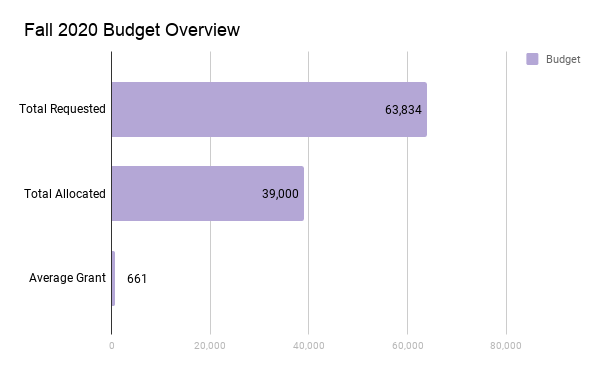The Student Government Association (SGA) held its bi-annual budget meeting Wednesday to allocate and vote on funds given to each eligible student organization this semester.
59 student organizations this year received funding from SGA; together those organizations requested a total of $63,833.70.
61.1% of the requests were covered with the average grant being $661.
This semester, SGA has been faced with unique challenges in response to COVID-19.
“COVID has certainly affected our budget in many areas and posed several challenges,” said SGA treasurer and senior financial management major from Keller Ross Dean. “SGA’s overall budget decreased a considerable amount this year, and this affected how much we were able to allocate to organizations. For instance, we were only able to allocate $39,000 this fall, compared to the $50,000 that was allocated last fall.”
The budget meeting itself covered the general information around the decreased budget but also provided information on how they are managing efficiency within the budget. SGA presented the student organizations with the four core principles on which their spending is going to be graded: reliability, modesty, engagement and consistency.
“These four core principles are objective measures that give each organization clear marks to aim for,” Dean said.
As for the four principles, reliability makes sure students are spending the majority if not all of their allocations, modesty is preventing students from overreaching in their initial requests, engagement helps determine the amount of active students in reference to the amount of allocations they may need and consistency is used to ensure SGA allocates predictable amounts from budget to budget.
Student organizations will receive a score based on their management of the four principles and better scores may lead to better allocations.
“Student organizations can improve their allocation chances by managing the four principles by which SGA budgets,” Dean said. “If an organization is considering how many students they impact, how effectively they spend their money and how much they reasonably need to request, then that organization will be well-prepared to receive an equitable allocation.”
Before the meeting, each student organization was given an initial budget and then were provided with an opportunity to lobby their class senators to approve amendments to the budget prior to voting.
International Student Association (ISA) was an organization that successfully lobbied for an amendment to receive an extra $100. The annual ETHNOS show is being filmed and broadcasted at the drive-in theatre due to COVID-19 regulations.
“We actually cost more than normal years, but when we submitted [our budget], we underestimated how much everything would cost,” said ISA Treasurer and junior mathematics major from Japan Ayaka Miyake. “We got the money and realized ‘oh this it not enough’ and so we wanted to try to get more money.”
SGA has put in place ways for student organizations to return money they may not use as way to increase their reliability score and help other organizations like ISA that may not have received enough funding.
The next budget meeting will take place next semester to approve a new budget.

